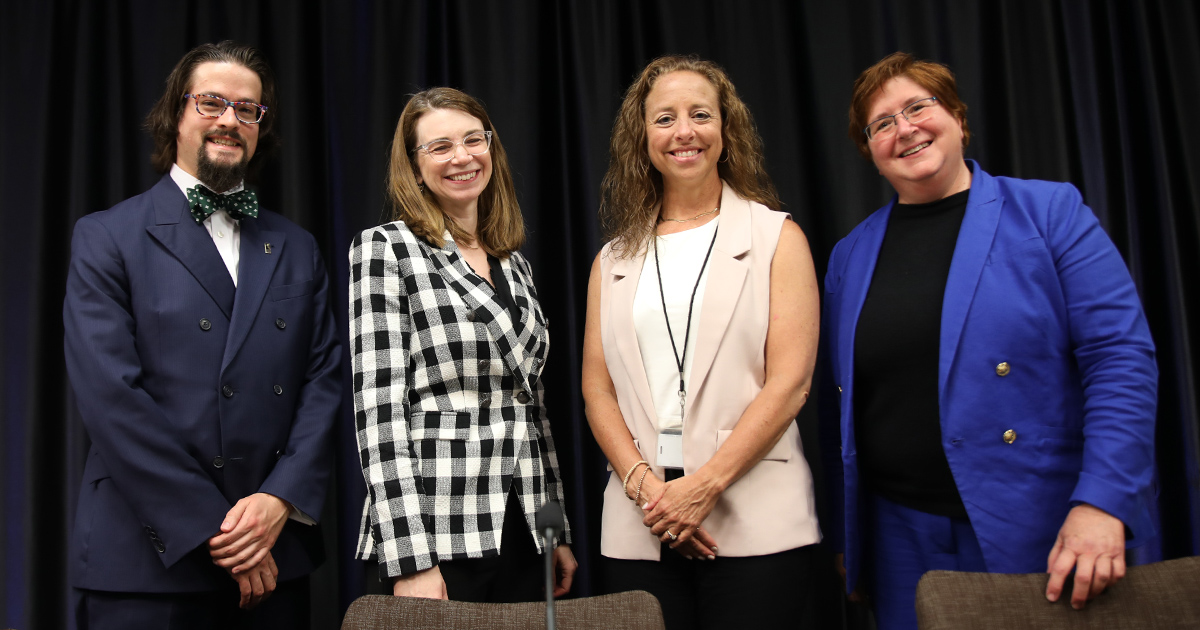
Presenters for 'Mental Health Literacy for Lawyers' include (from left) Solomon Gatton, Wisconsin State Public Defender’s Office, Sheboygan; Amanda Canessa, Dane County Corporation Counsel, Madison; Sarah Henrickson, LCSW, Journey Mental Health, Madison; and Amber Ault, LCSW, State Bar WisLAP manager.
“This should be part of every lawyer’s education.” To paraphrase Oscar Wilde, the compliment feels like the kind I can live off of for months.
The event? “Mental Health Literacy for Lawyers 2024,” presented by WisLAP (Wisconsin Lawyer’s Assistance Program) with support from State Bar of Wisconsin PINNACLE® – a 6.0 LAU CLE program presented live at the State Bar Center on May 31, 2024.
A participant offered up this endorsement – and it made our months of planning and organizing feel very much worthwhile.
Why Should Lawyers Gain Mental Health Literacy?
It is important for lawyers to learn more about mental health issues affecting clients so they know when they can help, when professional treatment may be recommended, or when intervention may be needed.
Plus, an attorney’s own trauma from personal exposure to their clients' suffering or from life experiences can affect their own physical and mental well-being.
As a lawyer, you can learn how to recognize mental health challenges in order to provide the best service to clients, while at the same time protecting your own emotional balance, sense of self-worth, and well-being.
Mental Health Literacy for Lawyers teaches you various techniques for identifying and responding to your clients' challenges, especially if your representation takes the client through a legal process involving the challenging or traumatic experience itself, says Madison attorney Patricia McKinney-Lins, who attended the CLE program.
“Our reaction to stress, trauma and anxiety has a profound effect on not only our enjoyment of life, but also on our ability to serve clients effectively,” McKinney-Lins says “If we are aware of the mental health challenges inherent in the practice of law, we can manage our response with a variety of self-care practices,” she said.
The program also teaches lawyers about the system that is in place to respond to a client’s mental health crisis, including involuntary commitment under Wis. Stat. chapter 51, and the strategies crisis workers use to prevent that outcome.
‘Mental Health Literacy’ Now Available Via Webcast
If you missed it, don’t worry: “Mental Health Literacy for Lawyers 2024” is now available as a webcast seminar on specific dates in June and July this year.
For this CLE program, we brought together eight speakers to provide lawyers an overview of mental health issues commonly encountered in legal practice. Topics include:
mood dysregulation concerns, such as bipolar illness, anxiety, and depression;
personality and characterological problems; and
post-traumatic stress and suicide risk.
The speakers gave practical recommendations for how lawyers can recognize and respond to clients and colleagues experiencing these challenges. Throughout the program, speakers emphasized that mental health literacy can be regarded as an aspect of lawyers’ ethical obligation to practice with competence.
Some comments from participants:
“I really enjoyed the presentation by Dr. David Lee on the intersection of personality disorders with the practice of law. His presentation was eye opening and provided a lot of guidance on the three categories of personality types as well as how to communicate with each personality type. Dr. Lee provided valuable information and highlighted his own experiences on how he has learned over the years to navigate interacting with individuals with personality disorders.”
Gaining Insights to Better Assist Clients and Your Practice
Highlights of the program include:
Litigator Jennifer Mohamed mapped out the importance of self-awareness and self-regulation among lawyers as they respond to distressing situations.
John Schneider, a licensed clinical social worker (LCSW), gave a thorough explication of a range of disorders reflecting under-activation and over-activation of the nervous system (anxiety, depression, bipolar illnesses).
U.W. Law School professor Ryan Poe-Gavlinski offered practical examples of how lawyers can help clients stay regulated in legal proceedings.
Forensic evaluator David Lee, JD, Ph.D., entrusted the audience with his “rookie mistakes” in treating individuals with personality disorders and how he learned to be more helpful to such clients.
Prosecutor Kimberly Hardtke discussed how trauma can interfere with prosecutorial success and how to practice trauma-informed lawyering – not just because “it’s the right thing to do” but also because it’s the effective way to practice.
Journey Mental Health Center crisis worker Sarah Hendrickson (LCSW), Dane County Assistant Corporation Counsel Amanda Canessa, and Assistant Public Defender Solomon Gatton delivered a lively presentation about mental health risk assessment, chapter 51, and how the obligations of their roles position them in different stances relative to individuals in mental health crises.
The presentations gave attendees new insights and strategies for working with clients and other people in their lives. Given the expertise in the room, this wasn’t surprising.
‘Lawyers Care’
As in most educational endeavors, of course, there was a “hidden curriculum,” a message beneath the content. That unmistakable and consistent message was this: “lawyers care.” Litigators, prosecutors, professors, public servants, law firm partners, and lawyers working in clinical fields, policy, and lawyer-adjacent roles
care about people, about people’s rights, about being good at what they do.
And the demonstration of how much lawyers care would seem just as important a reason to make
Mental Health Literacy for Lawyers available to every law student and lawyer as what people learn from the program’s didactic content.
It’s the passion for people and justice that makes mastering the details worthwhile.
This article was originally published in the
The Lawyer's Journey blog of the State Bar of Wisconsin
Lawyers Assistance Program (WisLAP). WisLAP offers confidential support, consultations, and education related to mental health and wellness for lawyers.
